Starting a wedding blog is a great way to build a passive income stream using your wedding planning expertise and passion.
Take it from us – we’ve earned substantial revenue from our own blogging projects over the years. Here’s a small sample of our blog earnings:


We’ve also taught over 14,000 students how to build similarly successful and profitable blogs.
If you’d like to follow in their footsteps with a wedding blog, check out our 10-step guide below.
Why Start A Wedding Blog
If you’re passionate about weddings and want to share your knowledge and experiences with the world, starting a wedding blog is an excellent idea.
Not only can it be a fun and rewarding hobby, but it can also be a lucrative venture.
You can monetize your wedding blog in various ways, such as promoting services, selling wedding-related products, or partnering with affiliates. Our affiliate marketing statistics show the average affiliate marketer earns over $8,000 monthly, and the wedding industry offers many high-value products to recommend.
A wedding blog also lets you connect with other industry professionals, such as photographers, caterers, and dress designers, which can lead to valuable collaborations and partnerships.
As your blog grows in popularity, you may even have the opportunity to attend exclusive wedding events and share your experiences with your audience.
Examples Of Successful Wedding Blogs
Before we cover how to start a wedding blog, let’s check out some examples of what successful wedding blogs look like:
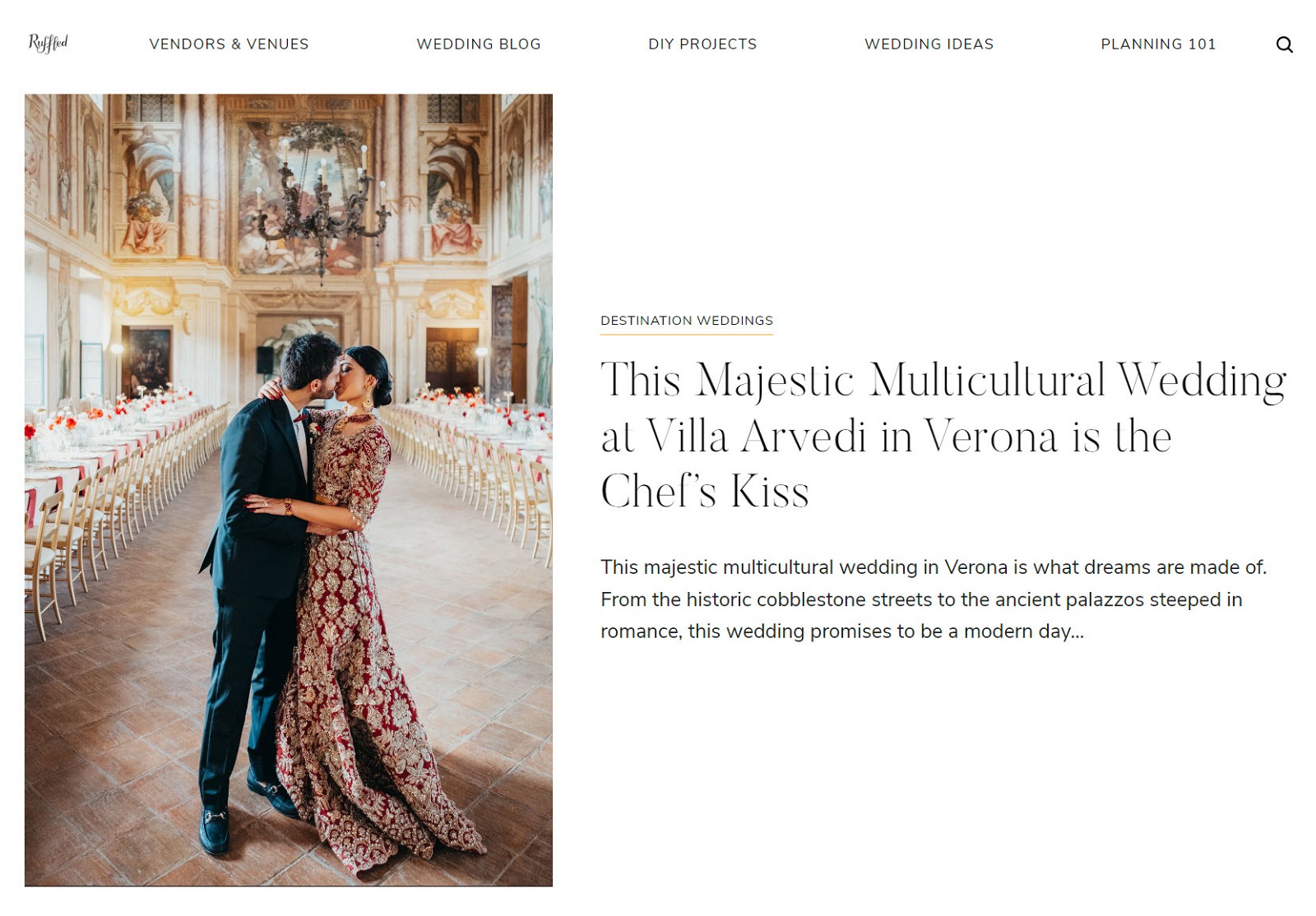
Ruffled
Ruffled is an informative blog with wedding ideas, planning tips, and vendor recommendations. Readers can submit their wedding experiences to be featured on the site.
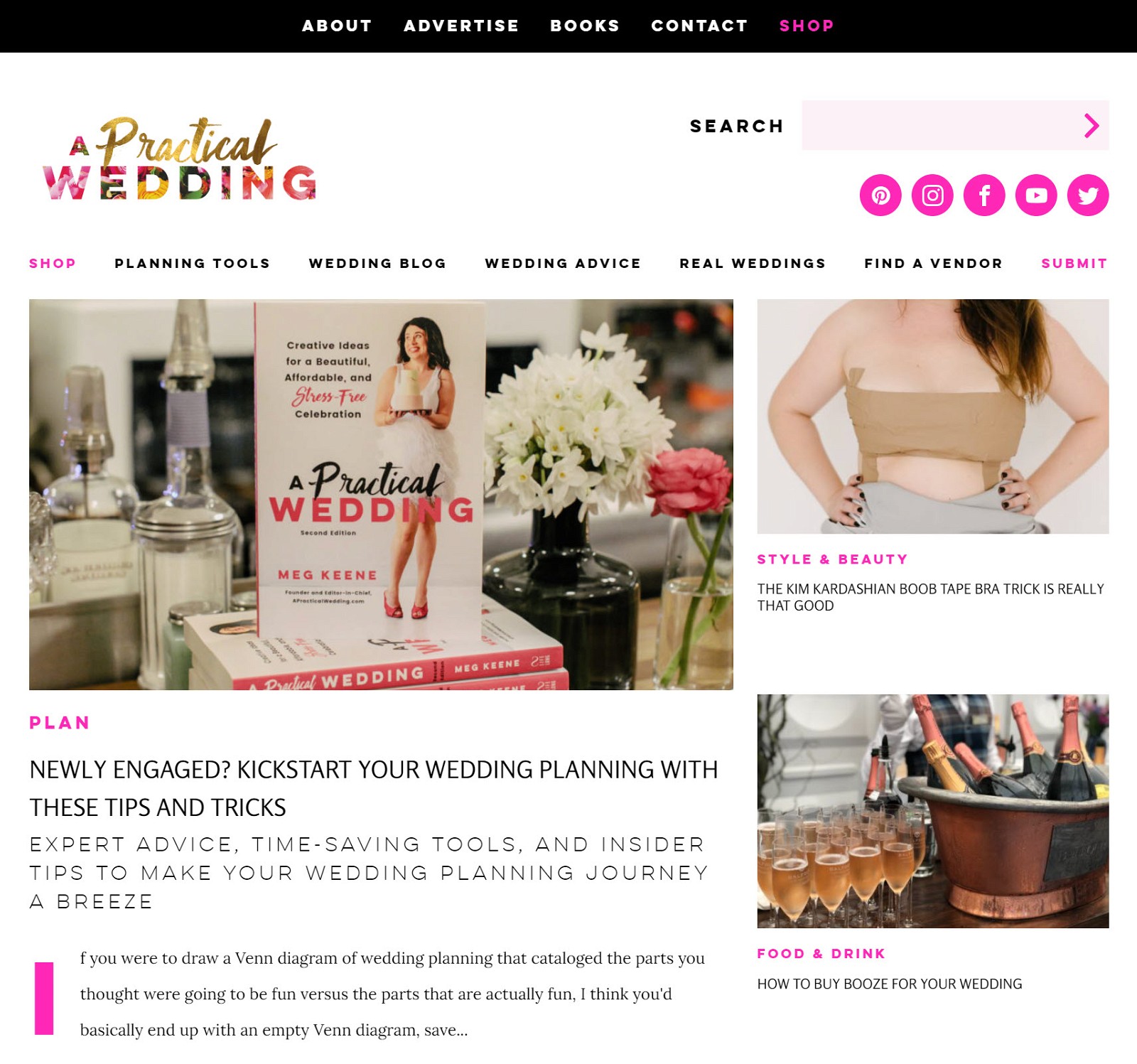
A Practical Wedding
A Practical Wedding is a blog started in 2008 by Meg Keene that offers realistic wedding planning tips and promotes equality and diversity in the wedding industry.
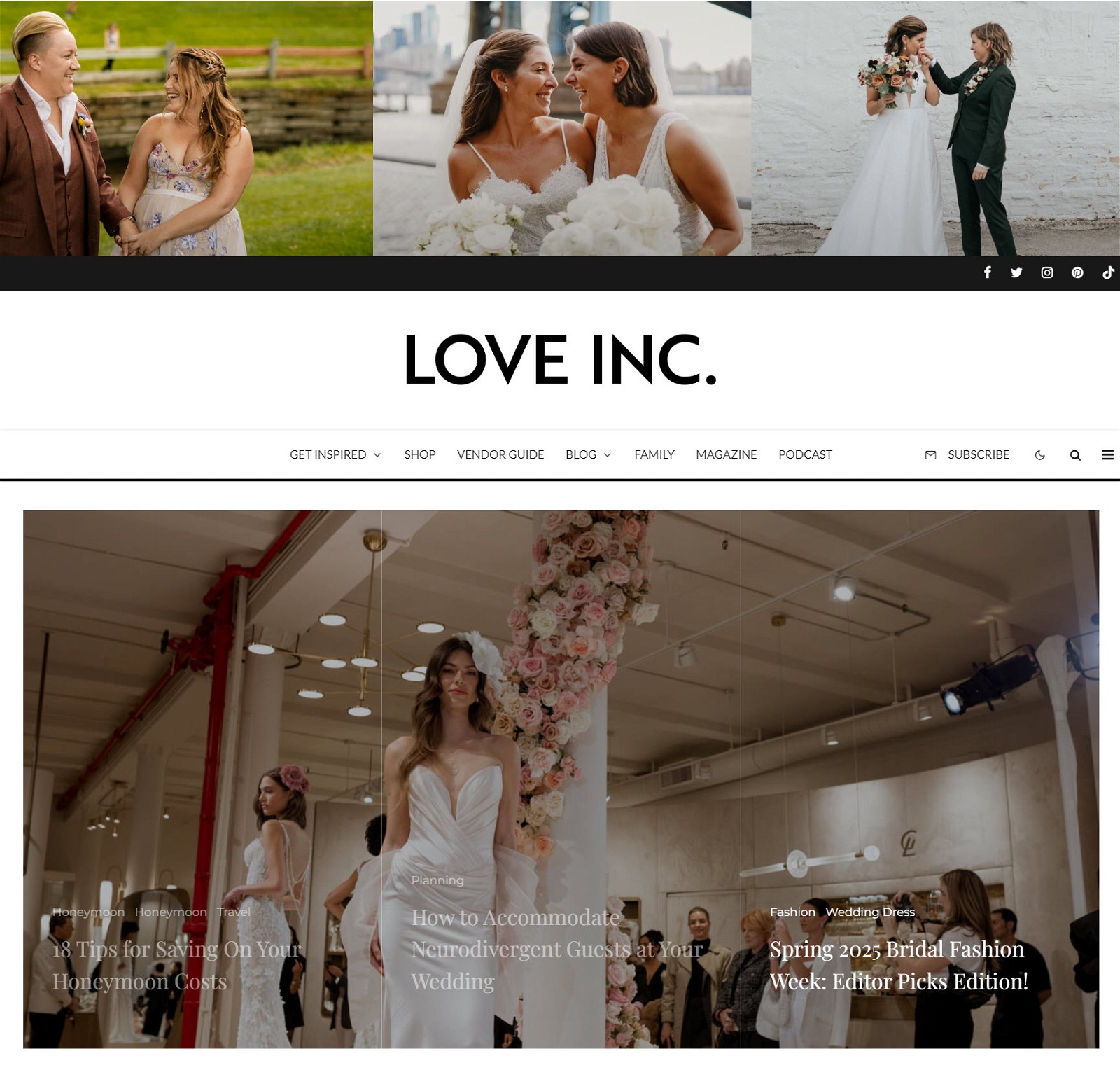
Love Inc
One of the most inclusive wedding blogs around, Love Inc. focuses on celebrating couples in many forms. The site has a podcast, galleries for inspiration, and a comprehensive vendor guide.
How to Start a Wedding Blog in 10 Easy Steps
Ready to launch your wedding blog? Follow this step-by-step guide to boost your chances of success.
1 Narrow Down Your Niche
Wedding bloggers can write about many topics related to weddings and marriage.
After all, the wedding industry is vast and diverse. Your blog can focus on anything, from helping couples plan their dream wedding to sharing tips for a happy and healthy marriage.
However, you’ll want to narrow your focus to maximize your chances of success.
Think about it – if you’re looking for inspiration and advice for a beach wedding, which would you prefer to visit?
- A blog exclusively dedicated to beach weddings
- A generic wedding blog that covers all types of weddings
Most people would prefer the first option.
By niching down, you can attract a more focused audience, and it’ll be easier to establish your blog as a go-to resource in that area.
Here are a few potential sub-niches:
- A vendor-focused wedding blog: Many wedding blogs focus on couples, but what about vendors? Create a blog with tips for photographers, caterers, and new wedding planners.
- Wedding planning and prep: Help couples handle the stress of preparing for the big day with wedding blogs covering everything from seating charts to color palette selection.
- Wedding style: Look at everything from dress styles to shoes and accessories for wedding party members, table decorations, and wedding themes.
- Wedding themes: Concentrate on specific themes, such as vintage, retro, or outdoor weddings for nature lovers.
- Honeymoon tips: Focus on what happens after the wedding, helping readers to plan honeymoons and even write “thank you” cards for attendees.
To ensure you’re picking a niche with profit and traffic potential, use a blog aggregator like Detailed or Alltop. These may not have wedding categories, but you can hunt for wedding blogs in adjacent niches like fashion and food.
Once you find a relevant blog, you can use the “Organic Competitors” report on Ahrefs to find similar blogs.
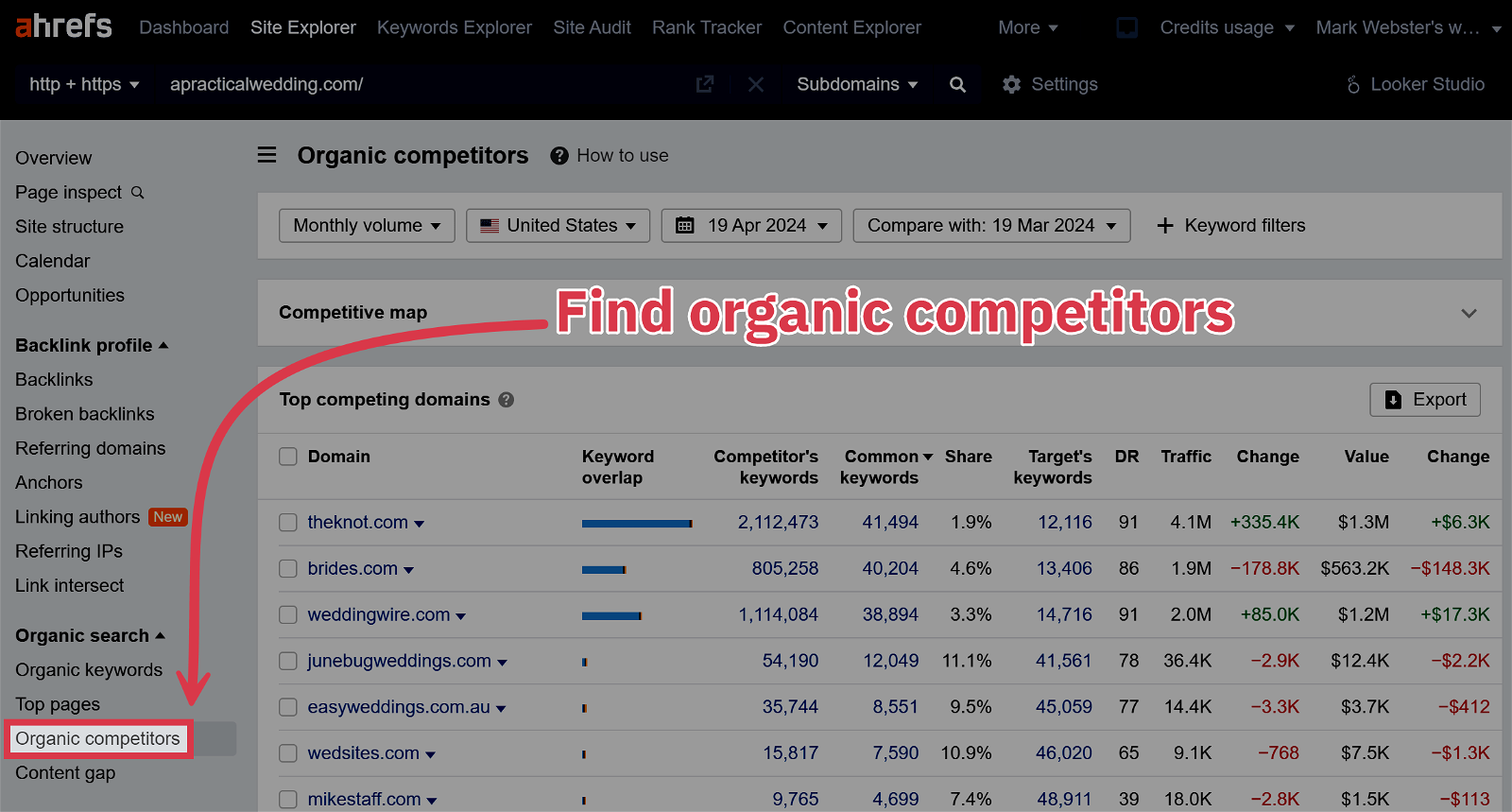
Next up is finding traffic levels. Sign up for a free trial of SE Ranking and use the Competitive Research report to see how many monthly visitors each blog gets.
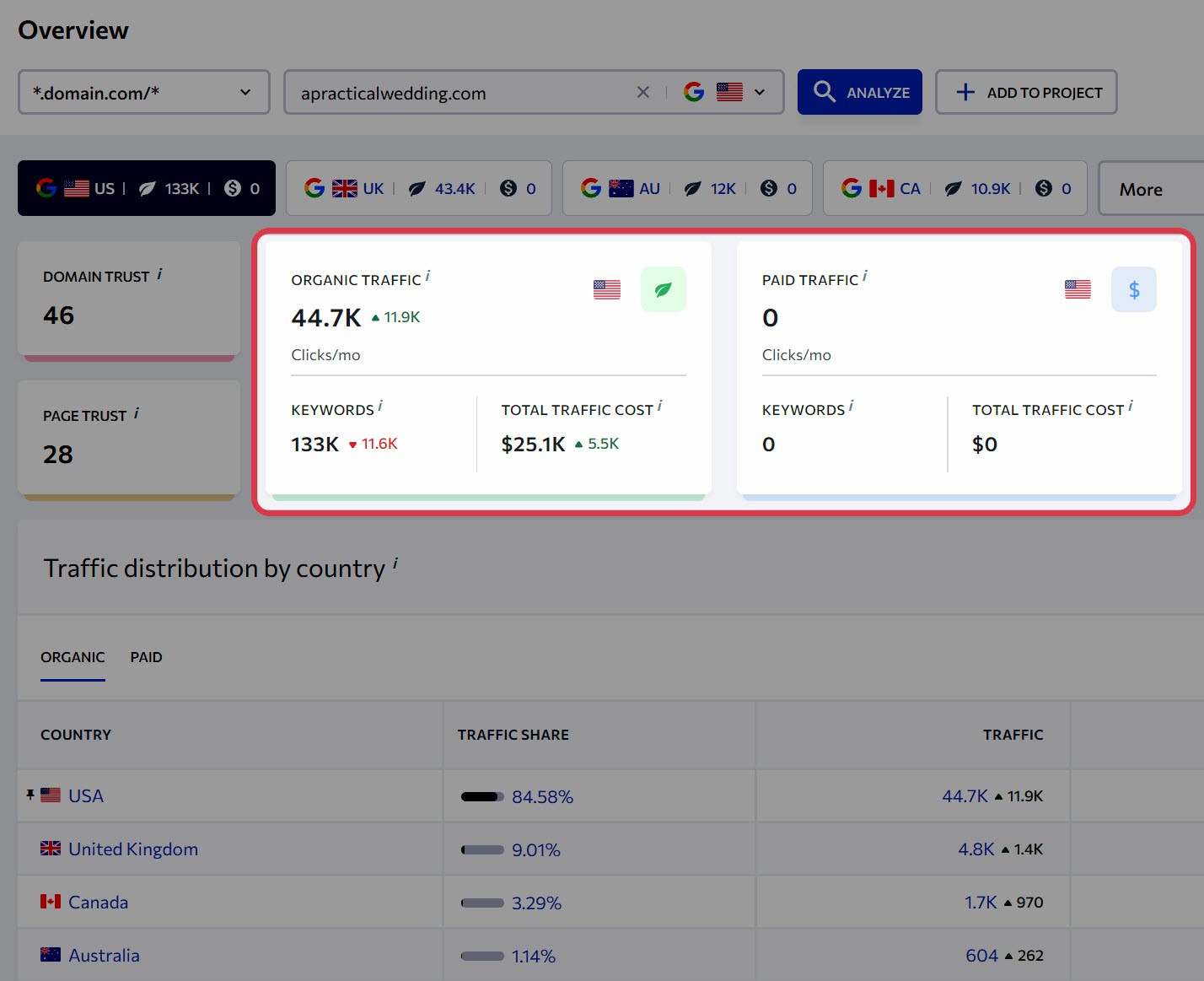
If you’re stuck between a few niches, you can compare their potential with Google Trends.
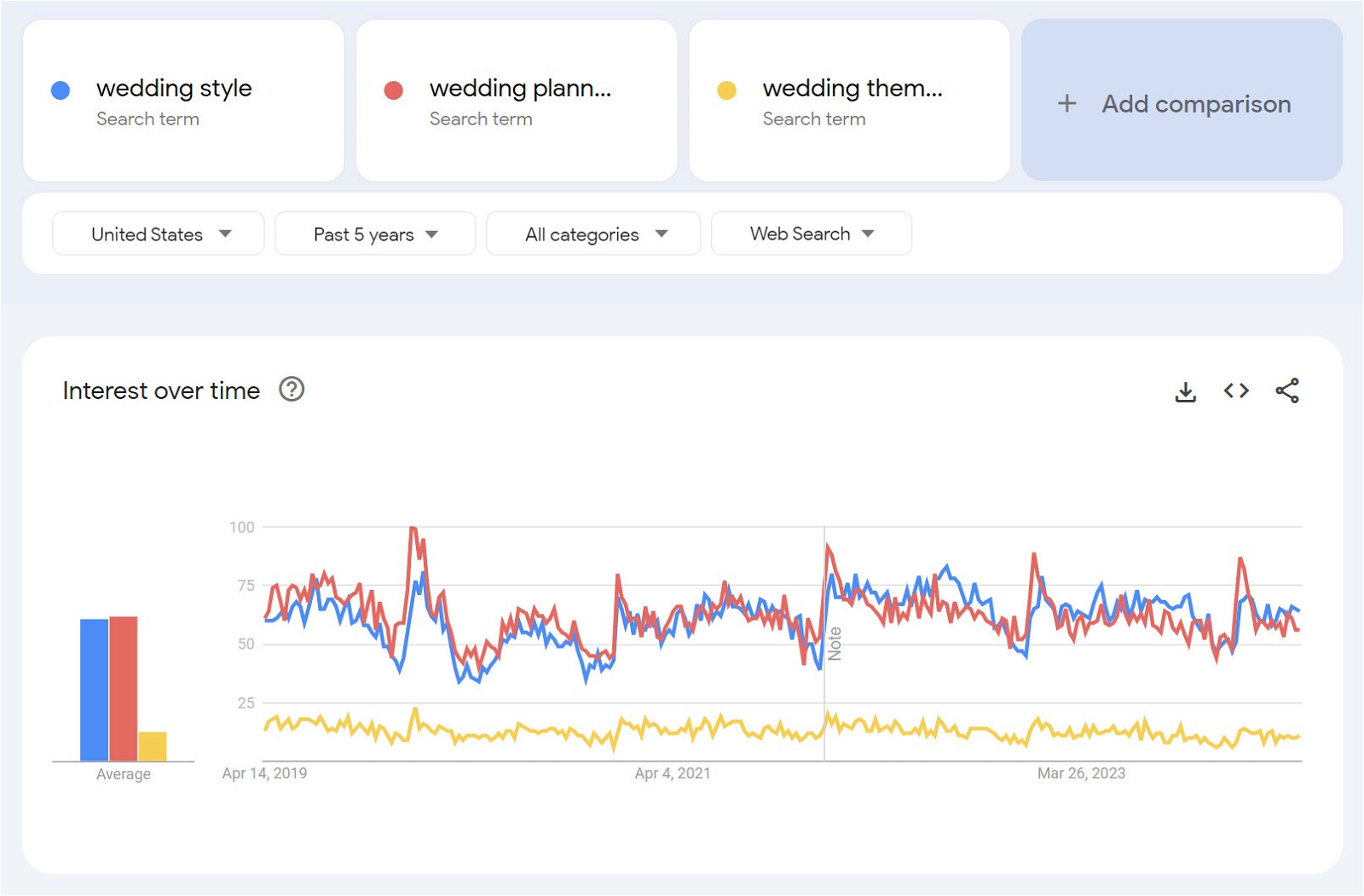
You want to choose a niche you’re passionate about that also has an audience hungry for more content. Look for that sweet spot — not too crowded with competition, but still popular enough to attract a dedicated following.
It’s also important to choose a niche that genuinely interests you. Your enthusiasm will shine through and make your blog posts more engaging for readers.
If you need extra help selecting a niche, check out our guide here:
When you’re ready to tie the knot with your choice, move on to the next step.
2 Choose a Blogging Platform
Now you know your niche, you need a platform to host and promote your content.
While free social blogging sites like Medium or Blogger may seem appealing, they come with limitations. It’s hard to make money, and you have less control over what you can say. The platforms can even remove your posts if you don’t adhere to their content guidelines.
You also can’t customize your blog’s design – you’re stuck with the platform’s design.
Creating your own website is the best option, as it comes with some key advantages:
- You’re in full control – no one else can alter or remove your posts
- You can monetize your content with ads and affiliate links to generate income
- You can use SEO tactics and relevant keywords to attract free traffic from search engines
- An eye-catching design is just a few clicks away – easily change colors and layout to engage readers
- Growing your blog also boosts your social media presence, keeping you connected with fans
- You can build an email list for direct audience access, insulated from algorithm changes
- Your blog is a valuable asset you can sell for a hefty profit. We’ve sold multiple blogs for six-figure sums ourselves
I’ve used many blogging and website-building platforms, but I always go back to WordPress.org (not to be confused with WordPress.com).

With WordPress.org, you can build your site for free (though you do need to pay for hosting and a domain name). WordPress is also easy to use and extremely flexible. You can customize your site with plugins and unique themes.
3 Choose Your Domain Name
There are already thousands of wedding blogs. Even if you choose a specific niche, you need a memorable brand to outshine the competition.
This starts with selecting an iconic domain name for your site.
A domain name is the digital address for your wedding blog, made up of your website name and a TLD extension, like “.com”:

You need something easy to remember and spell (so people can find you) and something that makes your blog stand out.
Here are a few tips to boost your chances of success:
- Be descriptive: Your wedding blog domain name doesn’t have to tell people exactly what you write about but should offer a hint. People searching for wedding planning tips are more likely to visit “weddingplanning.com” than “loveandrings.com.”
- Consider using keywords: Give your wedding blog an SEO boost by adding relevant keywords to your name, such as “wedding,” “marriage,” or “honeymoon.”
- Choose a .com domain: There are many domain TLDs, including .love. But a .com domain is still the most authoritative and recognizable choice. If you have a great name but an unavailable .com, consider a .com alternative.
- Make it memorable: Have fun with your name. Experiment with rhyming, alliteration, or metaphors, like “TheKnot” or “WeddingWonders.”
- Check originality: Always do a trademark search before choosing a domain name. You don’t want your blog to be associated with a pre-existing company.
If you’re struggling to find a great domain name, an AI domain name generator like Brandsnap is great for getting your creative juices flowing.
Once you’ve chosen your name, you’ll need to buy it. We recommend Namecheap, which costs as little as $10 annually.
4 Buy Web Hosting
You’ll need hosting if you use a WordPress.org site for your blog. This means paying for the infrastructure you need to deliver content on the web.
There are plenty of great hosting providers out there. Many beginners recommend Bluehost because it offers cheap plans.
However, we recommend SiteGround. They provide a faster and more user-friendly service for around the same price.
Here’s a step-by-step process for getting SiteGround hosting:
Step 1: Go to their WordPress Hosting page.
Step 2: Select the cheapest plan (StartUp). This plan has everything a new wedding blog needs. Note that this is an introductory price, and the cost will increase when your subscription renews.

Step 3: Add the domain name you bought in the previous step.
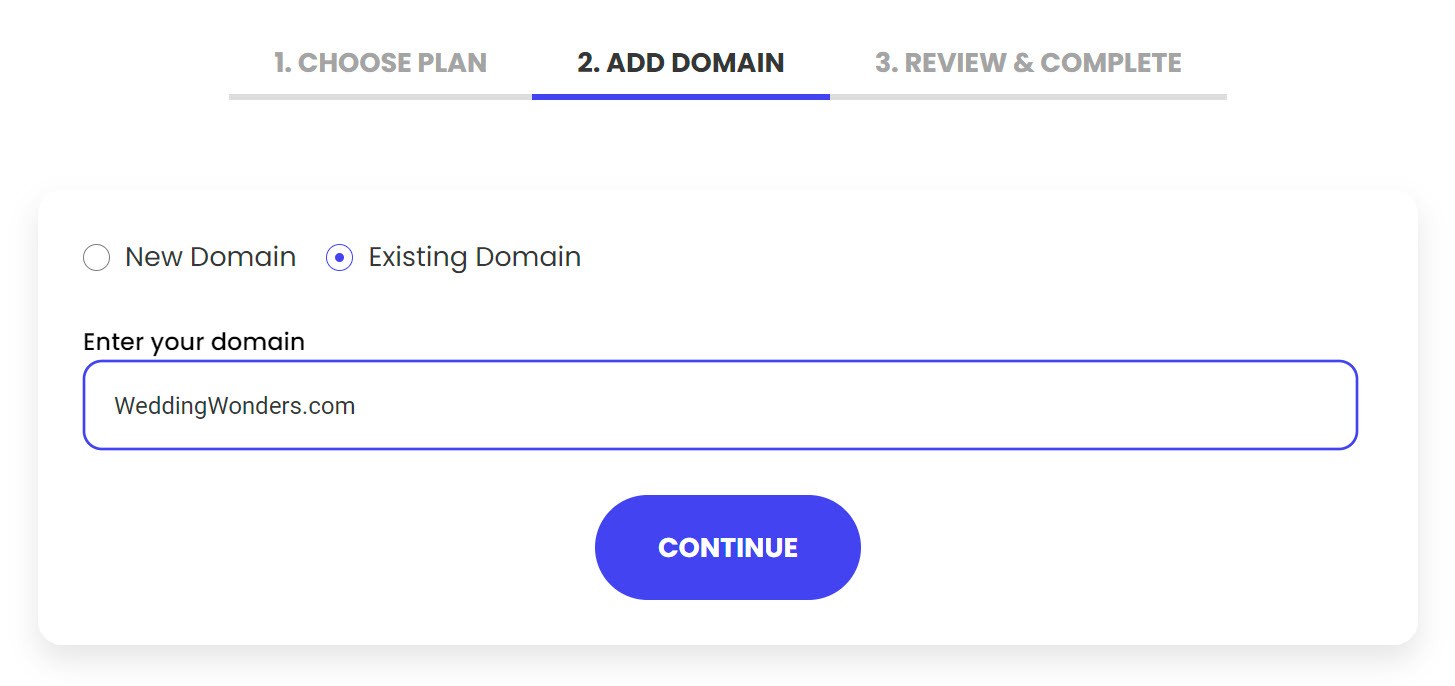
Step 4: Add account and location details.
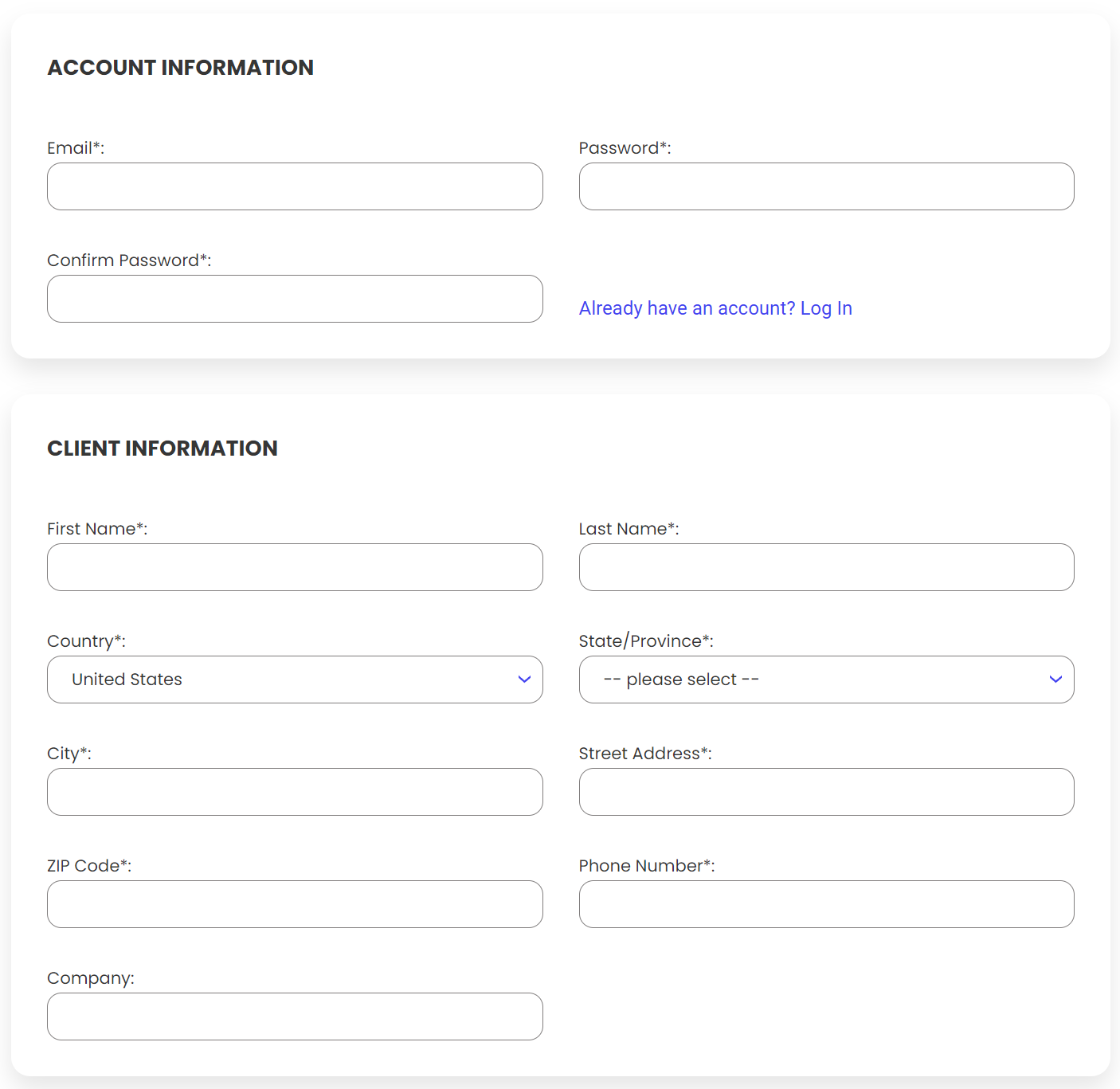
Step 5: Add payment info and pick your subscription period. The 12-month plan is the best value.
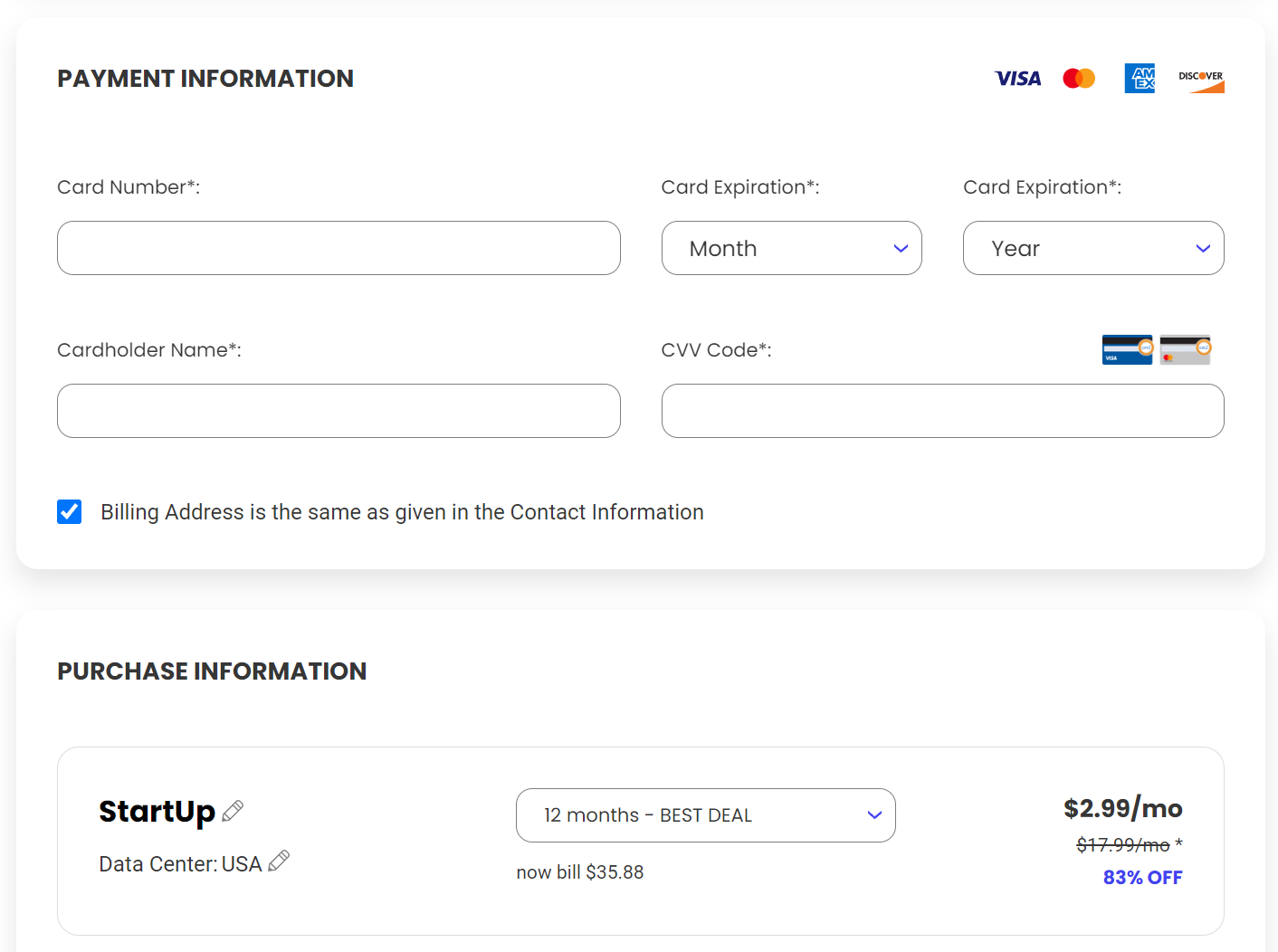
Step 6: Skip the extra services — you don’t need them for a new blog.
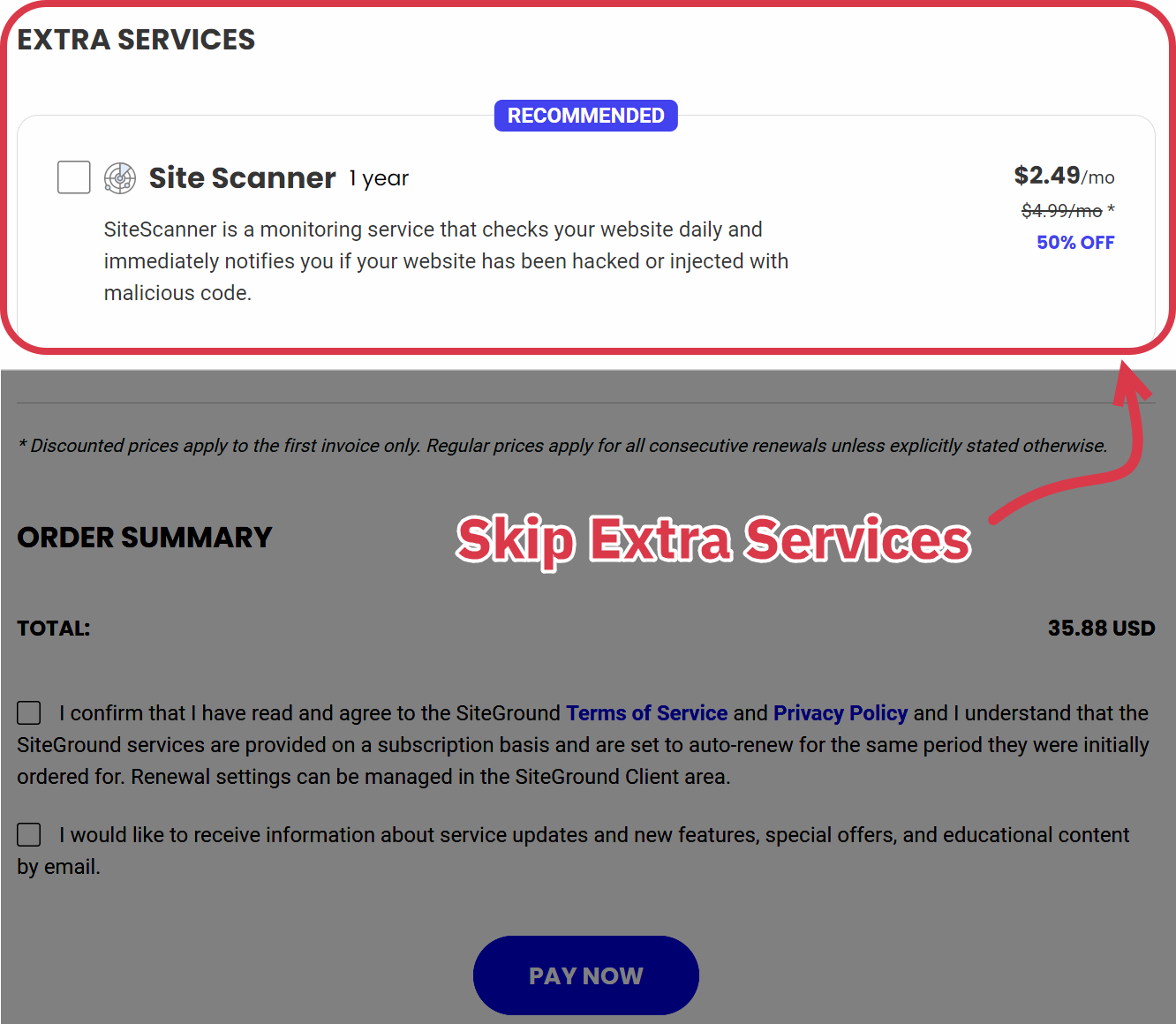
Step 7: Point your Namecheap registered domain name to your new SiteGround hosting server. This DIY guide will walk you through it, or you can contact SiteGround support.
Congrats! You’ve now got hosting for your wedding blow. Now, it’s time to flesh out your design.
5 Choose a Theme for Your Wedding Blog
Now it’s time to select a WordPress theme for your new wedding blog. This theme will define your site’s look, feel, and structure, so choose one that matches your preferred style.
When starting, I recommend using a free WordPress theme that offers a premium upgrade. Free themes work well for beginners, but you may run into limitations as your blog grows if you can’t upgrade.
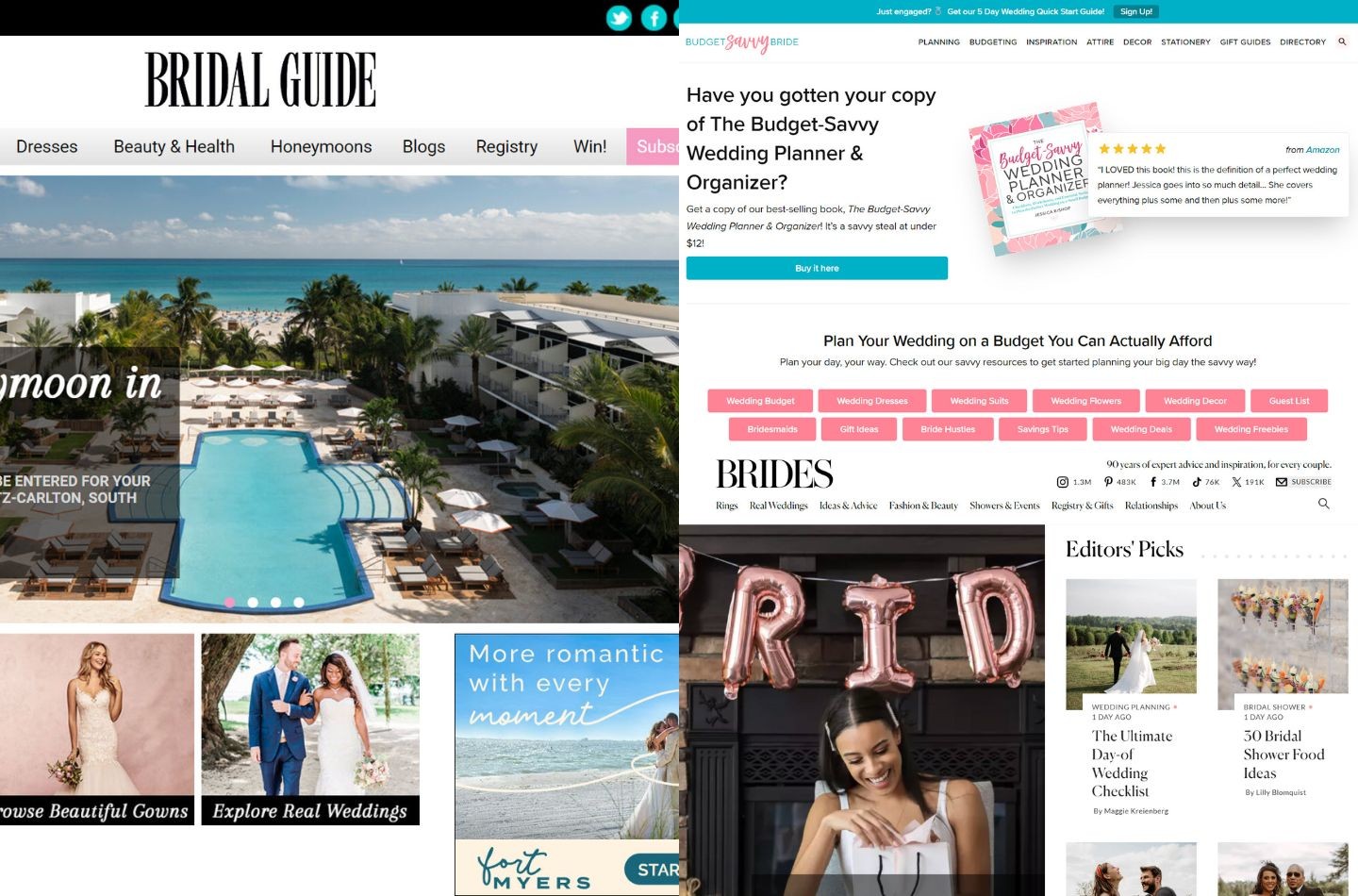
To avoid this, consider one of my top three theme suggestions below. They all have excellent template options and provide free versions with the ability to upgrade:
Once you pick your theme, follow these steps to install it:
Step 1: Log in to your WordPress dashboard.
Step 2: Go to Appearance > Theme in the left sidebar
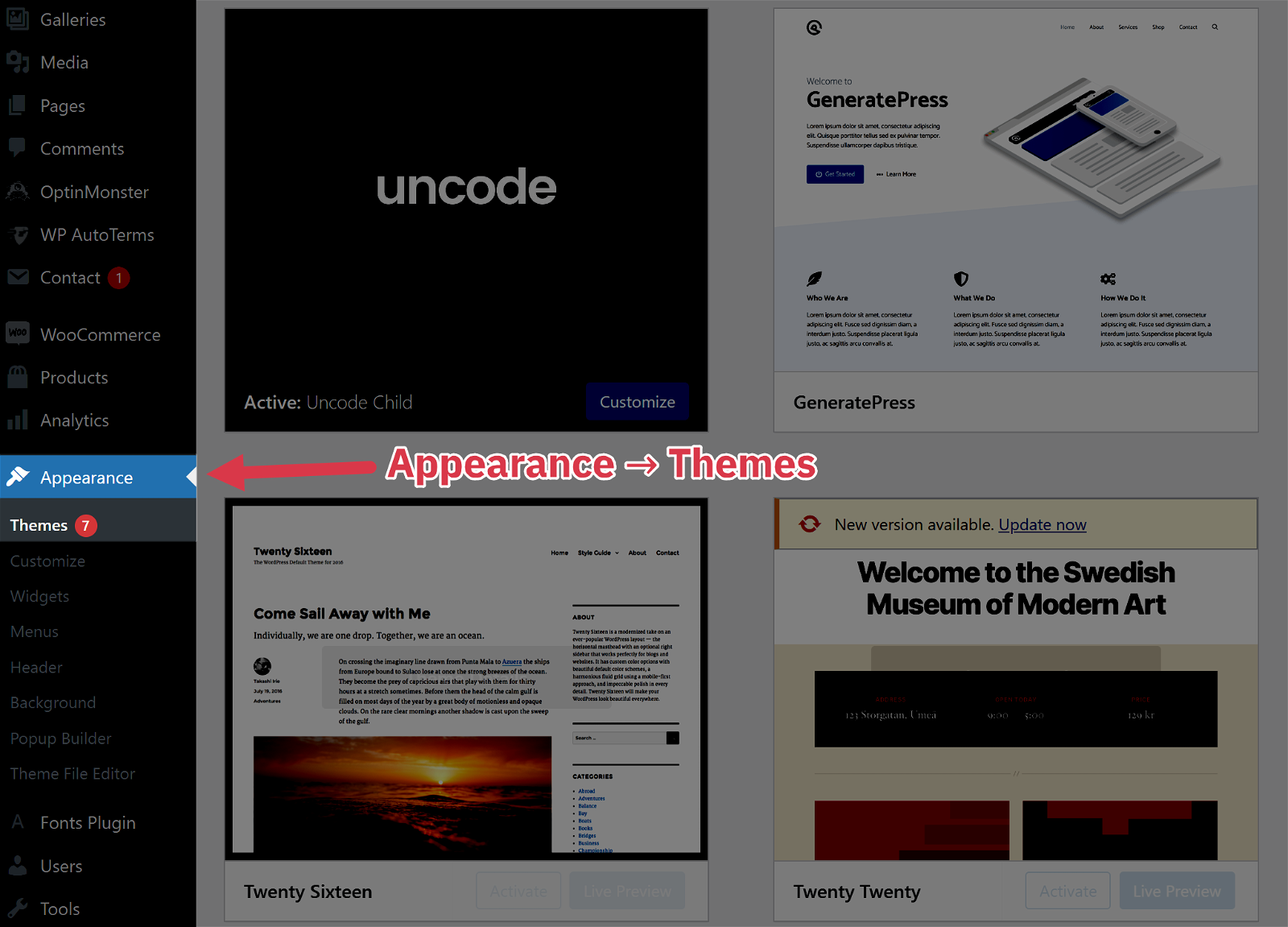
Step 3: Click “Add New.”
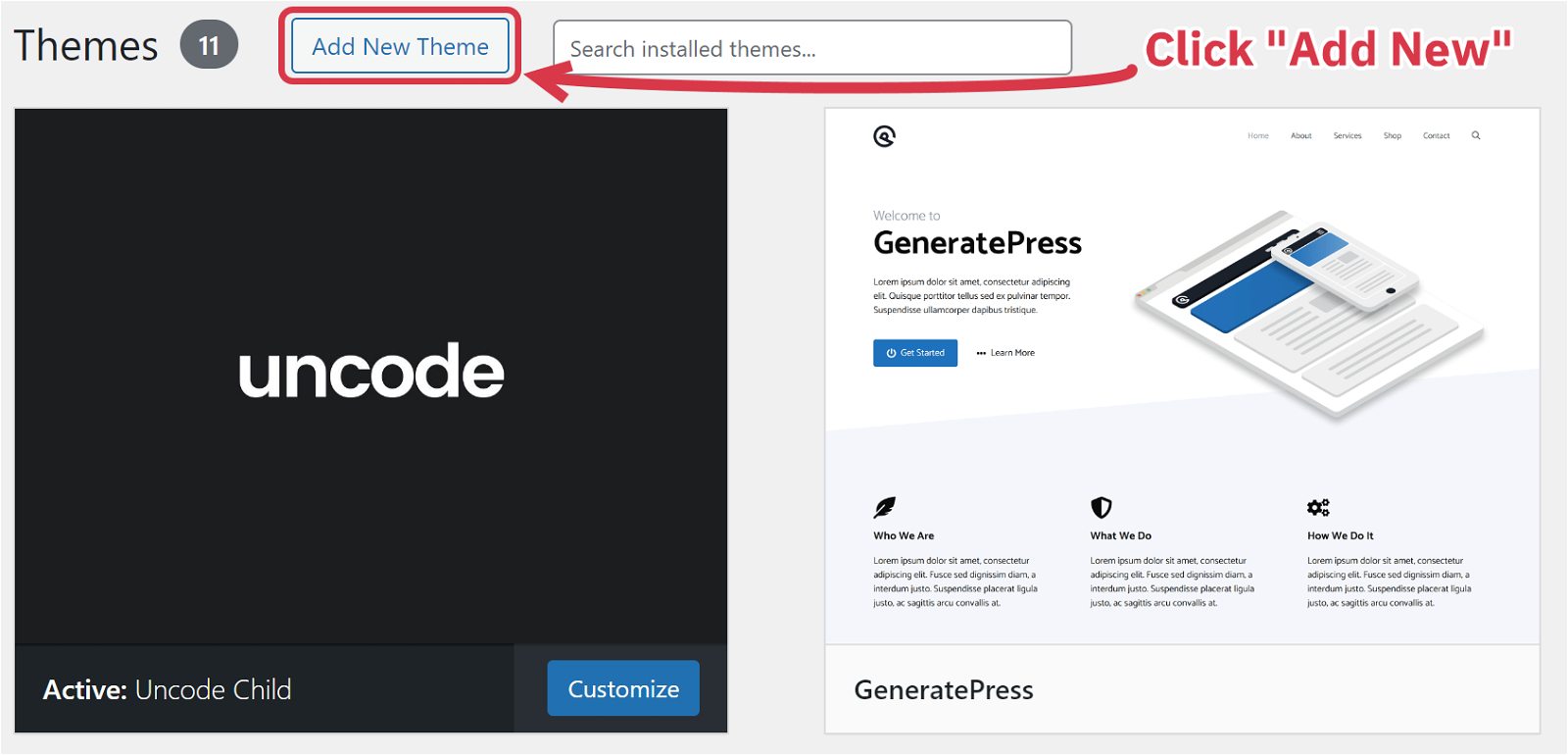
Step 4: Search for the theme you want to use.
Step 5: Click “Install Now” and “Activate.”
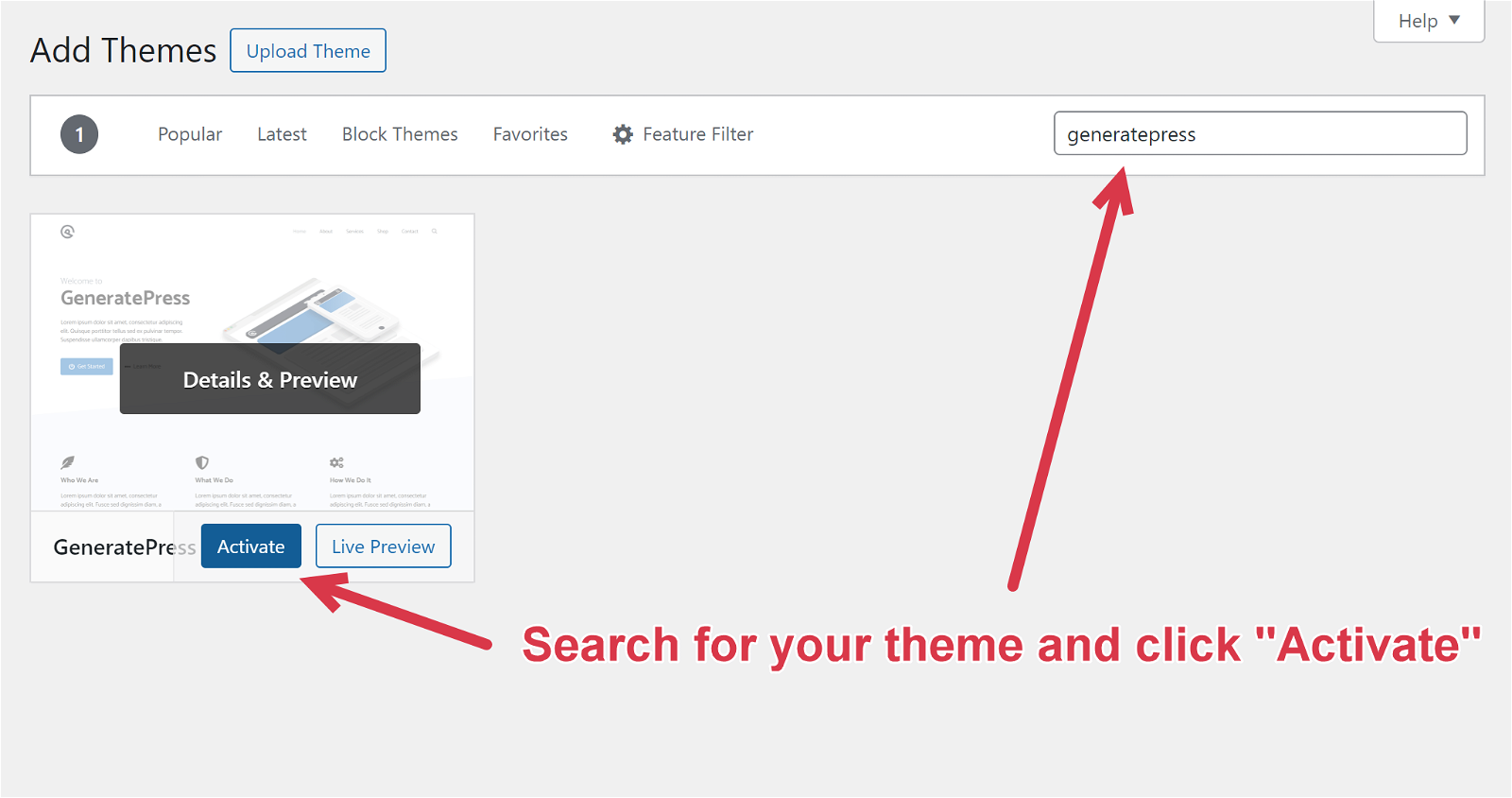
Now that the theme is added, you must add some basic design elements.
6 Decide on Design & Branding
A good theme gives you the foundation for an attractive wedding blog. However, it’s still up to you to differentiate your website with the right branding and design.
You need a few things for a great brand, but a color palette is one of the most important things to start with.
For a wedding brand, you might choose romantic colors like pink, purple, and red, or experiment with classic colors like white and gold. Think carefully about your target audience and what kind of personality you’re trying to convey.
I recommend using Coolors to find a matching color scheme.
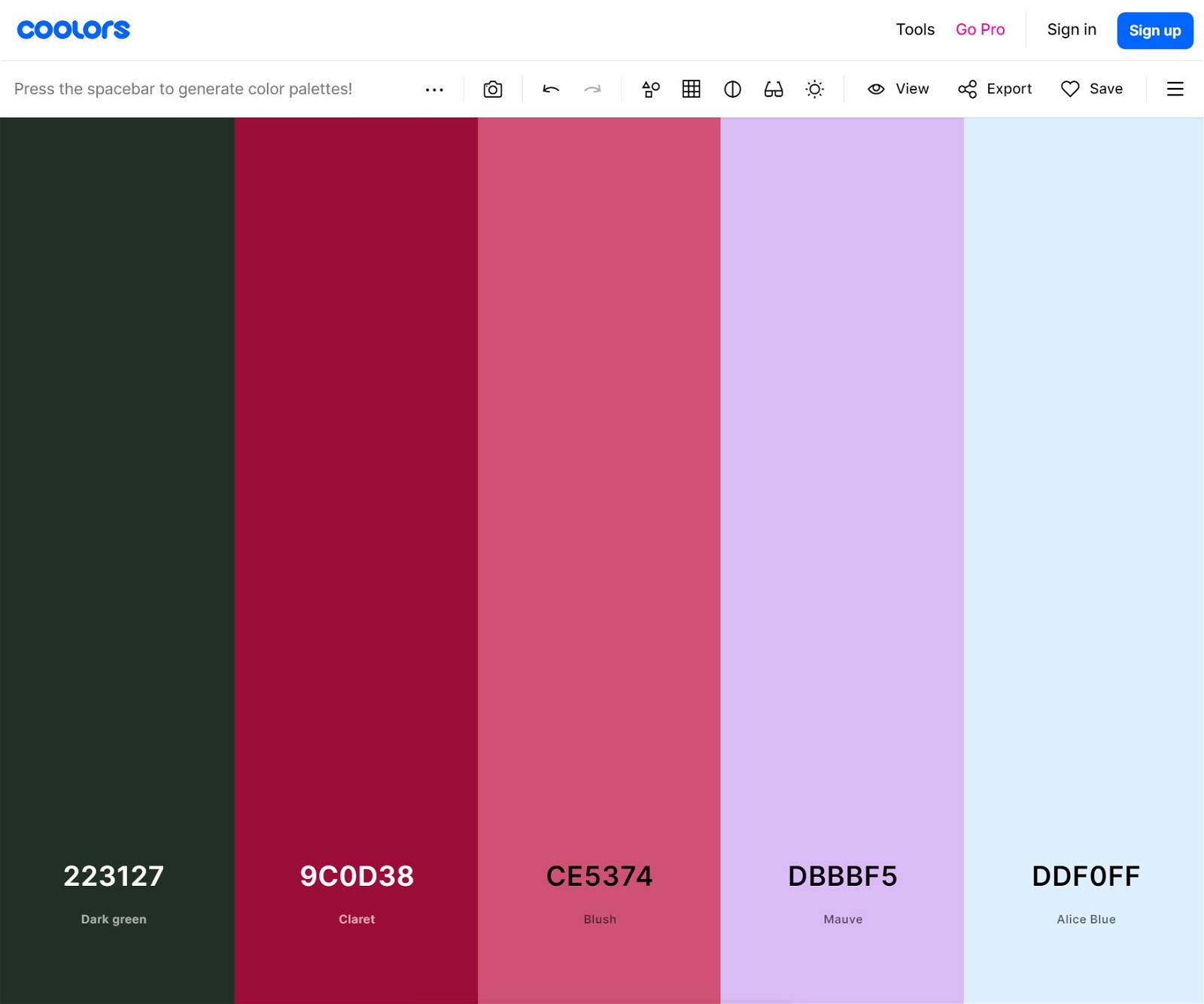
Once you have your color palette, you can look into logo design. Canva is a great logo creation tool, even if you’re not skilled at graphic design.
Open Canva and search for “Wedding logo” to get started. You’ll see many design options you can customize with your colors.
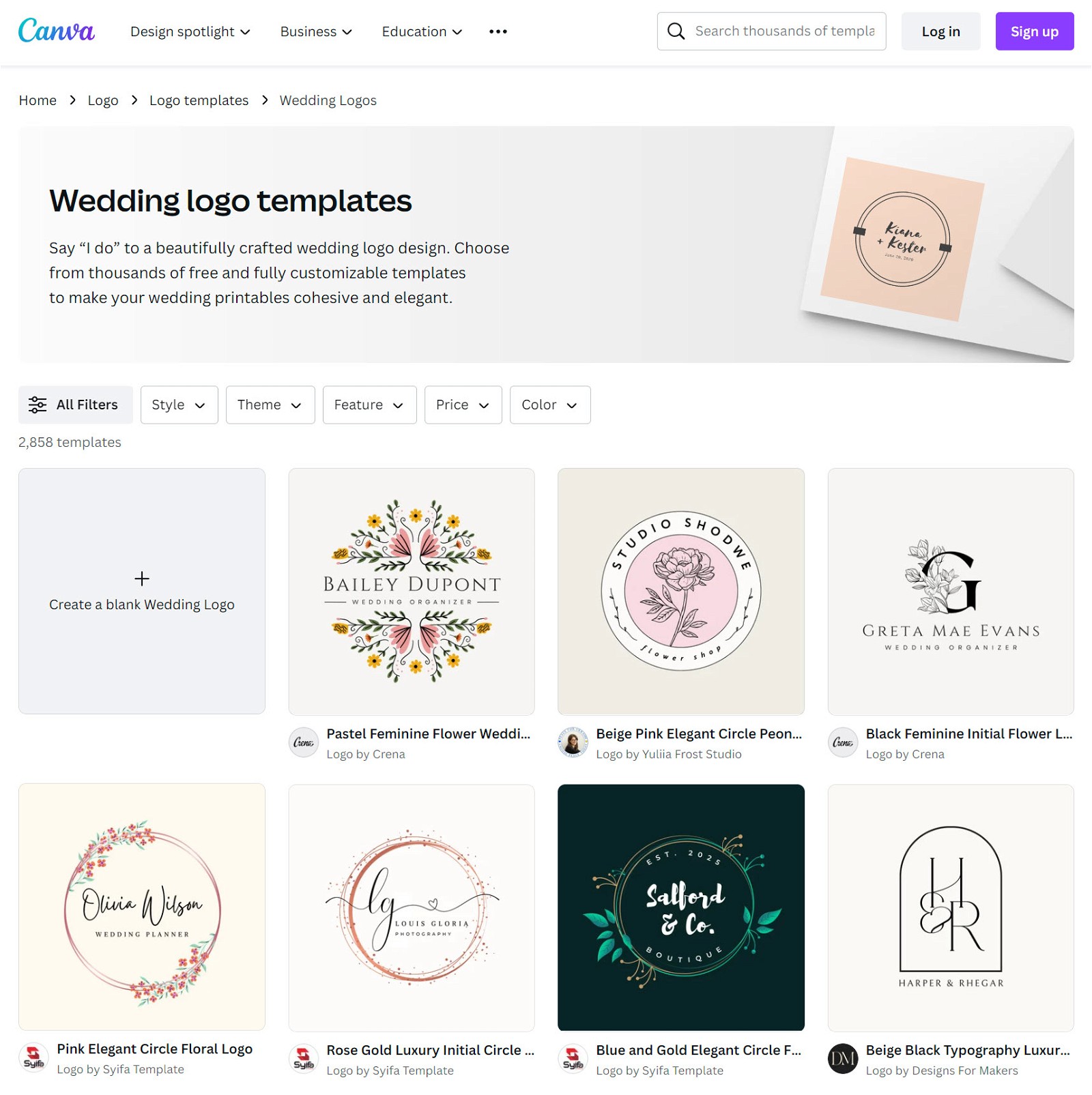
Once you’ve found a logo, you can use it across your website, social media posts, and even your packaging if you sell products.
7 Create Essential Pages
Now you’ve got your website, theme, domain name, and even your logo, it’s time to create a few essential pages for your site.
Homepage
Your homepage is often the first page visitors see, so it should share the content of your wedding blog and ensure visitors can easily navigate to important sections.
About Page
A good “About” page is crucial for a wedding blogger. It tells your audience why they should trust your opinions and advice. Here, you can provide insights into your experience in the wedding industry or accompanying niche.
You can also tell a story that helps you connect with your audience more deeply. Talk about how you fell in love with wedding photography, planning, or catering and why you decided to become a blogger.
👉 Check our list of great About page examples for inspiration.
Contact Page
Ensure your contact page includes a basic contact form, links to your social accounts, and an email address at a minimum.
Privacy Policy + Terms & Conditions pages
These are legal pages that every blog needs. You can generate these for free using PrivacyPolicies.com.
To add these pages, go to your WordPress dashboard, click “Pages” in the left-hand menu, and select “Add New.”
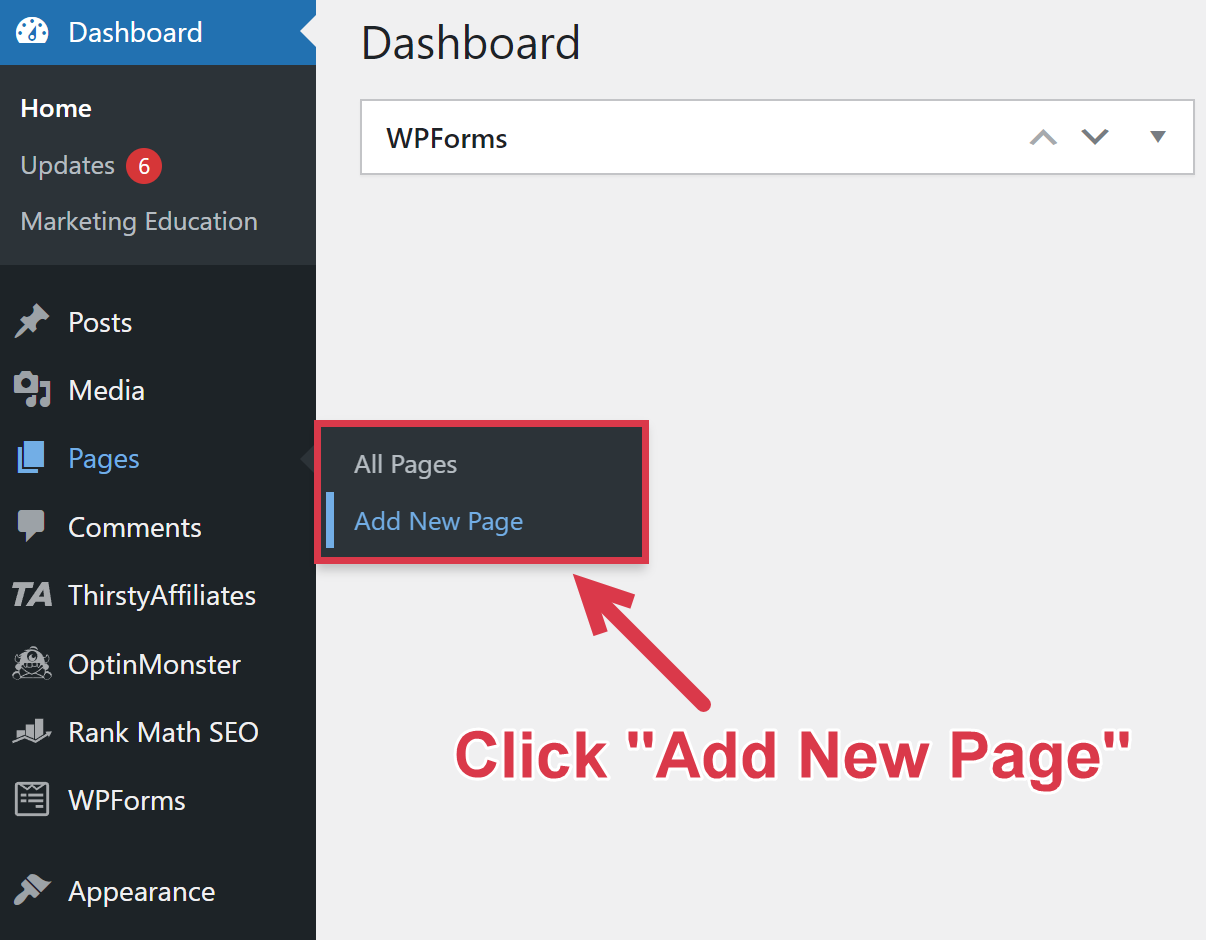
8 Start Creating Content
While writing about anything that comes to mind may sound fun, I recommend using a keyword-focused content strategy.
Targeting the right keywords is essential for attracting readers and monetizing your wedding blog. The goal is to create content around search terms that engaged couples frequently use.
When you optimize your posts effectively, search engines like Google may display them to users looking for those keywords, driving targeted traffic to your blog.
However, simply writing about the most popular wedding topics won’t guarantee immediate results.
High-volume keywords also face fierce competition in the search rankings, making it difficult for new blogs to rank highly.
The smarter approach is to target less competitive wedding-related keywords. This improves your odds of getting traffic and generating income. Look for keywords with lower competition but still many monthly searches.
Ahrefs Keyword Explorer is the perfect tool for this research.
Enter a “seed keyword” relevant to your wedding blog niche. This will reveal keywords that strike the optimal balance between search volume and competition level.
For instance, if you search for “wedding planner” in Ahrefs, you’ll see results like:
| Keyword | Monthly Volume | Keyword Difficulty |
|---|---|---|
| How to become a wedding planner | 2,700 | 10 |
| How much does a wedding planner cost | 2,800 | 22 |
| Wedding planning spreadsheet | 1,200 | 18 |
| How to find a wedding planner | 200 | 25 |
Use these keywords to make blog post titles. Here are some examples:
- A Step-by-Step Guide to Becoming a Wedding Planner
- How Much Does a Wedding Planner Cost? We Did The Math
- The Ultimate Wedding Planning Spreadsheet: Streamline Your Process and Impress Clients
- How to Find a Wedding Planner in 10 Easy Steps
Once you have 10 blog post titles, it’s time to start writing! Use these tips to ensure you’re crafting great content:
- Research your audience: Learn as much as you can about your audience and the questions they ask. You can even check out the “People Also Ask” section on Google for insights into possible subheadings for your articles.
- Understand intent: Think about the intent of your audience when they’re searching for your target keyword. The more relevant information you can give, the better your post will do.
- Share personal experience: Tell your own stories and share anecdotes. This will differentiate your content from other, more generic blogs.
- Be cautious about copyrights: Don’t assume they’re free to use because a caterer or vendor shares photos on their website. Ensure you have permission to use any multimedia content you’ll show in your blog.
- Be visual: Most wedding blogs are packed with inspirational images. Include images if you’re writing about wedding themes, dress styles, or color palettes. Create your own, or use tools like Pixabay and Flickr to find stock photos.
- Use internal links: If you mention something you’ve covered in another article, link to it. This makes navigating connected posts easier for customers and search engines.
- Stay focused: Don’t stray into different, unrelated topics. Stay focused on your keyword. If you’re writing about wedding color palettes, don’t start discussing venue options too. You can always create a different article later.
Feeling overwhelmed? Remember the golden rule for great blogging: deliver value. Your blog posts should be more informative, engaging, and experience-driven than anything else on the search results.
9 Promote Your Wedding Blog
Articles optimized for search engines should eventually gain traction, but it won’t happen overnight.
Fortunately, there are many other ways you can promote your wedding blog. Here are some of our favorite options:
- Post on community forums: Share your wedding blog posts on community forums and “group” channels on Facebook. You can even check out subreddits like r/Wedding or r/WeddingPlanning.
- Create shareable resources: Get your audience to do your promotion for you with resources they’ll want to share, such as color palette generators, wedding-themed quizzes, or directory lists for vendors.
- Collaborate: Work with other experts in the wedding industry. Post guest blogs on high-authority websites, or interview wedding vendors and planners and share their insights on your blog.
- Use visual social channels: The wedding niche is perfect for visual social media channels like Instagram and TikTok. Promote your content with trending hashtags, or participate in hashtag challenges to attract more followers.
- Attend wedding events: Get involved with local wedding fairs and events in your industry. This is a great way to find new customers, promote your blog, and even form relationships with future partners.
Remember to avoid being spammy or aggressive. You should focus on connecting with your audience, not just driving traffic.
10 Monetize Your Wedding Blog
Once you have traffic coming to your wedding blog, it’s time to think about monetizing your blog.
There are many ways you can boost your income with a great blog. For instance:
Use Affiliate Marketing
Join an affiliate program and promote another company’s wedding-related products or services. You earn a commission on each sale referred through your affiliate links.
Why It’s Great: Affiliate marketing is one of the best ways to monetize a wedding blog. You can promote a wide range of products and services, from catering and photography to bridesmaid dresses and wedding decorations, without handling inventory or customer service.
Get Started: Read our guide on how to start affiliate marketing and find products to promote in our list of the best wedding affiliate programs.
Try Display Ads
Show display ads on your blog and earn money based on views or clicks.
Why It’s Great: Display ads can provide a passive income stream with minimal effort on your part. You can work directly with wedding industry companies or use an ad network to streamline the process.
Get Started: Start with a user-friendly platform like Ezoic. You can explore more advanced ad networks like Mediavine or Raptive as your traffic grows.
Sell Physical Products
Partner with dropshipping or print-on-demand companies to sell customized wedding products without handling inventory or shipping.
Why It’s Great: Selling wedding products allows you to offer tangible value to your audience while earning a profit. Dropshipping and print-on-demand services minimize your upfront costs and logistical responsibilities.
Get Started: Research popular wedding products and identify reliable dropshipping or print-on-demand partners. Integrate their products into your blog, showcasing them through engaging content and product pages.
Create Paid Courses
Create premium courses teaching vendors how to manage a schedule, price their products, or update their marketing strategies.
Why It’s Great: If you’re targeting a B2B audience, paid courses can be lucrative. Wedding vendors and business owners are often willing to pay for insights to improve their services and capture more clients.
Get Started: Identify the key challenges and knowledge gaps among wedding vendors. Create comprehensive courses addressing these topics using platforms like Teachable or Thinkific and promote them to your audience.
Sell Spots on Vendor Directories
Sell spots on a comprehensive “vendor directory” list to local wedding-related companies.
Why It’s Great: If your website has substantial traffic, vendors will happily pay for the opportunity to get more exposure for their business. It’s a win-win situation, as you earn income and provide a valuable resource for your audience.
Get Started: Create an attractive, user-friendly vendor directory on your website. Reach out to reputable local vendors and offer them paid listings.
Promote and Sell Your Services
Showcase your expertise as a wedding professional and use your blog to promote and sell your services.
Why It’s Great: If you’re already skilled in a wedding-related field, such as planning, photography, or catering, your blog can be a powerful marketing tool to attract clients and grow your business.
Get Started: Highlight your services prominently on your blog, creating dedicated pages with detailed information and pricing. Share case studies, testimonials, and behind-the-scenes content to demonstrate your expertise and build trust with potential clients.
Summing Up
We’ve covered the essential steps toward starting a successful wedding blog…
…but there’s so much more I couldn’t cover.
Blogging has a deep learning curve, and if I tried to cover every important tip and strategy to maximize your chances of success, I’d probably have to write more than a million words.
That’s why we created a free training – it covers some of the best secrets and tactics we’ve learned in over 10 years of profitable blogging.
Our tests have found that bloggers who use this free training are 83% more successful than those who don’t.
FAQ
Do Wedding Blogs Make Money?
Wedding blogs can make money in various ways, including display ads, promoting wedding products or services, or selling wedding-related products. You can also use your wedding blog to promote your own services.
What Do You Write on a Wedding Blog?
On a wedding blog, you can write about many things, including venues, wedding day style tips, beautiful bridesmaids, destination wedding locations, and wedding favors. Cover a variety of topics to keep your content engaging and informative for readers.











